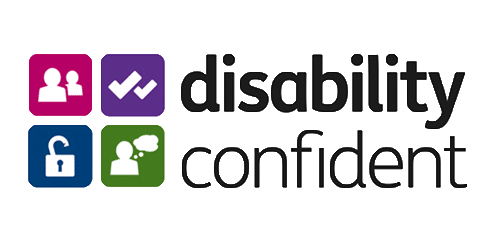At the very best of times, working with a disability can be challenging. During a pandemic, trying to find a job with a disability can seem impossible. Research shows that disabled people are twice as likely to face redundancy and find it much more difficult to find a new job afterwards. Added to this, only 52% of people with a disability between the age of 16 to 64 in Britain are in paid work (ONS 2019). That means that almost half of British people of working age with a disability don't have a job.
Here, we’ll explore what the disability employment gap is and what support you're entitled to if you’re disabled and looking for work. We'll also look at what's currently being done to close the employment gap and create more ‘disability confident’ organisations. From adjustments to interview schedules to protection against discrimination, we'll go over the facts and point you in the direction of resources that can help.

What is the disability employment gap?
The unemployment rate for disabled people is currently around 6.5%, which is almost double the regular unemployment rate of 3.5%. It’s this discrepancy that’s known as the ‘disability employment gap’. Without the right support, many disabled people struggle to perform their jobs and maintain their health, meaning that they are forced to choose one or the other.
People with a disability or learning difficulty face the following barriers to employment:
- lack of support to find and keep a job
- lack of support to build confidence and skills
- negative attitudes and stereotypes about disability
- lack of understanding about what people with a disability can do with the right support.
Employers should never assume that a person with a disability cannot do the job they’re applying for. There are people with disabilities working in every field, from nursing and teaching to sport, business, law, and IT - the list goes on! Thankfully, many organisations are working to close the employment gap by providing more training and resources for both job seekers and employers to find a job with a disability.
Support for disabilities in the workplace
Some health conditions fall under the Equality Act 2010. This means that employers must do what they can to remove any barriers disabled people might face within their organisation. If you have a disability, you are legally protected from unreasonable dismissal. It’s also against the law for an employer to refuse to hire you based on your disability. If you're not selected for the job, you should be given a valid reason for why not.
You don't have to tell your interviewer about your disability, and employers can't ask questions about your health. However, if you’re open about your disability, you’ll have more protection under the Equality Act and it will be easier to arrange the support you need in your role.
The Equality Act means that employers should make reasonable adjustments to the recruitment process or your working environment to meet your needs. So, if there are certain adjustments that would make your job easier or help you to overcome challenges, ask for them. According to Scope, adjustments may include adapted equipment like chairs, keyboards or voice recognition software, changes to the work environment, such as lowering desks and modifying entrances, IT software, changing working patterns and hours, and providing a reader, interpreter, or personal assistant. A ‘reasonable’ adjustment is based on what’s cost-effective, practical, and safe to enable valuable long-term employment.
Assessments, adaptations, and grants
Occupational Health can also assess what you might need and work with your employer to implement those adjustments. If money is a worry, you can apply for an Access to Work grant to pay for specialist assessments and adjustments. For example, you might need special equipment, support worker services, and help with transport to and from work.
If you need financial support whilst job searching, you can apply for government benefits, such as Universal Credit, Personal Independence Payment (PIP), or Disability Living Allowance (DLA). If you’re not sure what support you're entitled to when looking for a job, you can find professional guidance from the Scope helpline and the ACAS helpline. We recommend reaching out to both, as they offer a free service that may help to point you in the right direction.

Steps you can take to find a job with a disability
For people with a disability, having a job is about more financial independence. It’s about social inclusion and participating fully in society. Whether you have a disability or not, if you’re looking to gain employment, there are specific steps you should take:
- Find out what interests you. Think about your hobbies and what you’re good at, then look for job titles.
- Gain experience. Look for apprenticeships or placements in your local area, or volunteer to show your commitment to the industry.
- Begin relevant training. Many colleges can support you to get qualified and adapt to your learning or physical needs. For example, our online courses are ideal for those that would prefer to study at home and can be adapted to aid learning for people with dyslexia or read aloud for people who are blind.
- Decide on your hours. Think about what hours are realistic for you to work, whether it's part-time, full-time, or flexible hours. In some cases, a zero-hours contract is perfect as it alleviates pressure, so you can work the hours that you feel able to.
- Set career goals. Your goals should be measurable, for example: ‘I will apply for 20 jobs a week, or up to five jobs a day.’ Then tick off your list as you achieve each goal. You can use this goal planner to stay focused.
- Create your CV. Go the extra mile with a video introduction and a cover letter. How to do this is covered in our free Job Ready Pack.
- Get a reference. Seek out other professionals who would be willing to provide a written reference for you to attach to your CV.
Resources that can help

Look out for the ‘disability confident’ badge on adverts and applications. Disability confident is a government scheme created to support disabled people and those with health conditions in the workplace. It also helps businesses to benefit from the widest pool of talent and lead the way for inclusive work cultures. Companies displaying the disability confident badge commit to employing, supporting, and developing disabled people within their organisation.
The disability confident scheme has empowered thousands of disabled people to fulfil their potential and find job satisfaction. It also helps employers to secure loyal staff, reduce staff turnover, and improve team morale by treating all employees equally. Your local Job Centre can help you find disability-confident businesses.
Using the support and tools available
The Work and Health Programme is another government scheme that can help you find and keep a job if you’re currently out of work. Your local Job Centre Plus can provide you with a work coach who will assess your eligibility for the programme. On the programme, you’ll have extra support to identify your skills, get relevant training, and manage health problems. If you have a specific learning disability, MenCap has a dedicated helpline and service to help you gain the skills and confidence to find employment. They'll talk to you about how your benefits will be affected by work and offer possible sponsored internships and apprenticeships.
There are many job search websites you can use, including Indeed, Reed, CV Library, Total Jobs, and Timewise, amongst others. These sites let you create a digital profile and upload your CV for faster, direct applications. You can also sign up with Disability Jobsite, which supports disabled people with ‘barrier-free’ e-recruitment. And if you find a role that sounds perfect, it’s always worth checking on Glassdoor to find out a bit more about the company culture and employee experience of the business you’re interested in. Search for any employer on Glassdoor, and you’ll find reviews from current or former employees. From there, you may be able to find out how inclusive and supportive of disabilities the company is.
What can employers do to help disabled people?
In order to halve the disability employment gap, employers need to remove the barriers disabled people face in the workplace. Employers should make the well-being of disabled people central to their business plans. By maintaining a positive attitude towards disability, businesses will greatly benefit from the long-term employment of disabled people.
Employers should look at making their recruitment process inclusive and be open to adjusting this process if needed. For example, staggering interviews over weeks may allow candidates to demonstrate their abilities more effectively. Employers should also mention what coaching will be available to the candidate. Essentially, employers must consider people with a disability at every stage, from taking applications and interviewing to hiring and onboarding.
